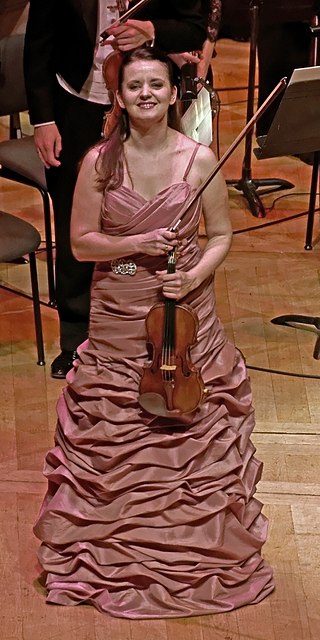Related Research Articles
Unsuk Chin is a South Korean composer of contemporary classical music, who is based in Berlin, Germany. Chin was a self-taught pianist from a young age and studied composition at Seoul National University as well as with György Ligeti at the Hochschule für Musik und Theater Hamburg.

Hans Abrahamsen is a Danish composer born in Kongens Lyngby near Copenhagen. His Let me tell you (2013), a song cycle for soprano and orchestra, was ranked by music critics at The Guardian as the finest work of the 21st-century. His opera The Snow Queen was commissioned and premiered by the Royal Danish Theatre in 2019.
Lera Auerbach is a Soviet-born Austrian-American classical composer, conductor and concert pianist.
Erich Wolfgang Korngold composed his Violin Concerto in D major, Op. 35, in 1945.
Michel van der Aa is a Dutch composer of contemporary classical music.

Baiba Skride is a Latvian classical violinist. She was the winner of the Queen Elisabeth Violin Contest in 2001.

Martin Lohse is a Danish classical composer and visual artist.
Ilona Breģe is a composer, pianist and musicologist.
Rebecca Saunders is a London-born composer who lives and works freelance in Berlin. In a 2017 Classic Voice poll of the greatest works of art music since 2000, Saunders' compositions received the third highest total number of votes (30), surpassed only by the works of Georg Friedrich Haas (49) and Simon Steen-Andersen (35). In 2019, writers of The Guardian ranked Skin (2016) the 16th greatest work of art music since 2000, with Tom Service writing that "Saunders burrows into the interior world of the instruments, and inside the grain of Fraser's voice [...] and finds a revelatory world of heightened feeling."
The Double Concerto for Violin, Cello, and Orchestra by Frederick Delius is a double concerto for violin, cello, and orchestra in C minor, composed between April and June 1915 while Delius lived in Watford, England. The work is dedicated to the sister duo of violinist May Harrison and cellist Beatrice Harrison, who premiered the piece under conductor Henry Wood on February 21, 1920 in Queen's Hall, London.
This article lists major events and other topics related to classical music in 2016.
The Boston Concerto is a concerto for orchestra by the American composer Elliott Carter. The work was commissioned by the Boston Symphony Orchestra, for which the piece is titled. It was first performed in Symphony Hall, Boston, on April 3, 2003 by the Boston Symphony Orchestra under the conductor Ingo Metzmacher. Carter dedicated the concerto to his wife Helen Jones Carter, who died on May 17, 2003.
Two Controversies and a Conversation is a composition for piano, percussion, and chamber orchestra by the American composer Elliott Carter. Its world premiere was given on June 8, 2012 at the Metropolitan Museum of Art in New York City by the pianist Eric Huebner and the percussionist Colin Currie with the New York Philharmonic under the direction of David Robertson. The piece is dedicated to Colin Currie and the pianist Pierre-Laurent Aimard. It was one of the last works composed by Carter, who completed the piece at the age of 103.
The English Symphony Orchestra and the English String Orchestra are two iterations of a British professional orchestra based in the city of Worcester, Worcestershire, in the West Midlands of England.

Let me tell you is a song cycle for soprano and orchestra by the Danish composer Hans Abrahamsen. The work was commissioned by the Berlin Philharmonic with support from the Danish Arts Foundation. It is based on the eponymous 2008 novel let me tell you by the writer Paul Griffiths. Its world premiere was given by the soprano Barbara Hannigan and the Berlin Philharmonic under the direction of Andris Nelsons on December 20, 2013.
Left, alone is a piano concerto for the left hand and orchestra by the Danish composer Hans Abrahamsen. The work was commissioned by the Westdeutscher Rundfunk and co-commissioned by the City of Birmingham Symphony Orchestra, the Danish National Symphony Orchestra, and the Rotterdam Philharmonic Orchestra. Its world premiere was given by the pianist Alexandre Tharaud and the Westdeutscher Rundfunk Sinfonie-Orchester under the direction of Ilan Volkov on January 29, 2016. The piece is dedicated to Alexandre Tharaud.
Kate Whitley is an English composer, comedian and pianist.

Tanja Tetzlaff is a German cellist. She played first as an orchestra member, but then as a soloist, a founding member of the Tetzlaff Quartet, a string quartet led by her brother Christian Tetzlaff, and as a chamber musician. She has recorded cello concertos and chamber music, including contemporary music, and has appeared internationally.
References
- 1 2 Abrahamsen, Hans (2011). "Double Concerto". G. Schirmer Inc. Retrieved July 6, 2016.
- ↑ Clements, Andrew (March 23, 2015). "Britten Sinfonia review – not enough guts in this Goldberg". The Guardian . Retrieved July 6, 2016.
- ↑ Molleson, Kate (January 20, 2015). "Hans Abrahamsen portrait review – a drive for clarity and concision". The Guardian . Retrieved July 6, 2016.
- ↑ Molleson, Kate (January 13, 2015). "A composer for the season". The Herald . Retrieved July 6, 2016.